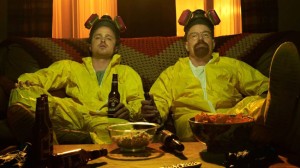By Daniel Janssen
Staff Writer
After finding out that he has terminal lung cancer, chemistry teacher Walter White suddenly sees his dull life in front of him. White knows his days are numbered, and with that idea in mind, he finds a way to provide for a family by cooking crystal meth with one of his slacking ex-students.
After five seasons and several signs of serious withdrawal, I am no longe r sure which one is more addictive: methamphetamine or the fictional series about the drug. Never before was there a series that set up so many absurd storylines, made it feel grounded and relatable, and provided near total closure after “just” five seasons. The writing behind Breaking Bad is by far the most excelling factor of the series.
r sure which one is more addictive: methamphetamine or the fictional series about the drug. Never before was there a series that set up so many absurd storylines, made it feel grounded and relatable, and provided near total closure after “just” five seasons. The writing behind Breaking Bad is by far the most excelling factor of the series.
Given the pressure from the television industry, it is mind-blowing to think how well the writing staff handled the improvisation that was often required: they were not afraid to try the most ludicrous of ideas, use borderline poetic symbolism in episodes and completely dive into the side characters that derailed the already elaborate story. This makes Breaking Bad one of the more difficult series to start as a viewer, but quadruples its emotional pay-off.
Complex storylines come with the need for a drive to make it work. Who is ever going to make a ruthless meth cook, who has no shame in calling himself “the danger”, a caring and relatable human being? Fortunately, there’s the wonderful Bryan Cranston who does exactly that to the anti-hero Walter White. His chemistry with sidekick Jessie Pinkman (Aaron Paul) not only blends into one of the better television duos of the decade, but it also builds the much-needed backbone in a series that includes such fleshed-out side characters.
Acting and general story aside, the real marvels of Breaking Bad are found in its detailed continuity. In episodic terms, the series uses a recurrent prologue structure, which heightens suspense as well as creativity. Whenever the questions brought forward in these prologues are not answered, do not expect them to remain that way: the meticulously crafted writing of Breaking Bad will make sure its ingenious returns at a later stage in the series.
However, structure is not the only strong suit in the series’ technical aspects. The series’ scores are always fitting; its cinematography consciously alludes to other famous scenes in film and its Albuquerque location remains easy on the eye.
By making an extraordinarily grandiose story feel incredibly human, Breaking Bad cannot only title itself one of the better series to ever premiere on television, but also the first series to convincingly use an epiphany on the toilet as its most important plot twist.
Daniel Janssen, class of 2015, is a Psychology and International Relations major from Alphen aan den Rijn, The Netherlands.
